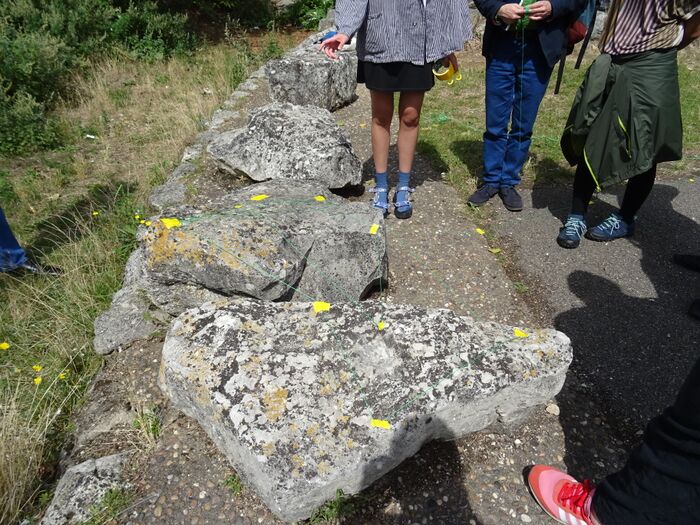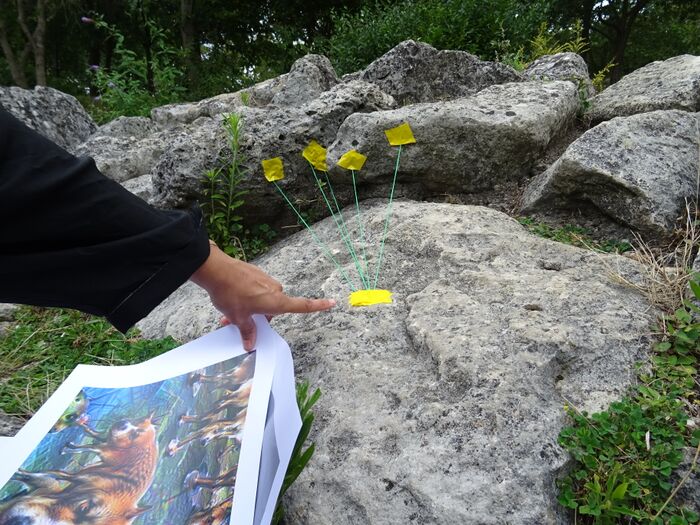Difference between revisions of "LiDAR on the Rocks"
| Line 1: | Line 1: | ||
== LiDAR on the rocks == | == LiDAR on the rocks == | ||
| − | '''The Underground Division (Helen V. Pritchard, Jara Rocha, Femke Snelting)''' | + | '''The Underground Division<br>(Helen V. Pritchard, Jara Rocha, Femke Snelting)''' |
| + | |||
''LiDAR on the rocks'' is a training-module for hands-on collective investigation into the micro, meso and macro political consequences of earth scanning practices. The module looks into how undergrounds are rendered when using techniques such as Terrestrial Light Detection and Ranging (LiDAR), magnetic resonance, UltraSound, and Computer Tomography (CT). | ''LiDAR on the rocks'' is a training-module for hands-on collective investigation into the micro, meso and macro political consequences of earth scanning practices. The module looks into how undergrounds are rendered when using techniques such as Terrestrial Light Detection and Ranging (LiDAR), magnetic resonance, UltraSound, and Computer Tomography (CT). | ||
Revision as of 17:28, 26 October 2021
LiDAR on the rocks
The Underground Division
(Helen V. Pritchard, Jara Rocha, Femke Snelting)
LiDAR on the rocks is a training-module for hands-on collective investigation into the micro, meso and macro political consequences of earth scanning practices. The module looks into how undergrounds are rendered when using techniques such as Terrestrial Light Detection and Ranging (LiDAR), magnetic resonance, UltraSound, and Computer Tomography (CT).
Preferably when surrounded by fake rocks, use green string and yellow tape to manually construct point clouds and experiment with Point of View (POV). Try to render intersecting positions and shift from individual to collective pareidolia (seeing worlds inside other worlds), while reading selected text fragments by N.K. Jemesin[1], Kathryn Yusoff[2], Elizabeth Povinelli[3], Karen Barad[4] and Denise Fereira da Silva[5]. Each session ends near a 1m3 area of grass that is marked for imagined digging, plus a DIWO metal detector to provoke plural renderings of the underground.
Participants in LiDAR on the rocks can now be introduced into the Initial Areas of Study (IAS) of The Extended Trans*feminist Rendering Programme (T*fRP):[6]
- connected subsurfaces
- stories of the undergrounds (sub-terranean science-fiction)
- subsurface politics and its constellations
Reader: LiDAR_reader.pdf
Notes
- ↑ N. K. Jemesin, The Fifth Season (The Broken Earth Trilogy #1) (Orbit, 2014).
- ↑ Kathryn Yusoff, A Billion Black Anthropocenes or None (Minneapolis: University of Minnesota Press, 2018).
- ↑ Elizabeth A. Povinelli, “Can rocks die?” Geontologies: A Requiem to Late Liberalism ( London: Duke University Press, 2016), 8-9.
- ↑ Karen Barad, “TransMaterialities: Trans*/Matter/Realities and Queer Political Imaginings,”. GLQ 1; 21 (2-3) (June 2015): 387–422.
- ↑ Denise Ferreira da Silva, “In the Raw,” e-flux Journal #93 (September 2018), https://www.e-flux.com/journal/93/215795/in-the-raw/.
- ↑ “The T*fRP exists to take care of the production, reproduction and interpretation of DIWO scanning devices and scanning practices within the field of a-clinical, underground and cosmic imaging. The programme invites fiction writers, earth techno-scientists and trans*feminist device problematizers to render imaginations of the (under)grounds and of the earth.” The Underground Division, “The Extended Trans*feminist Rendering Programme” 2019, https://possiblebodies.constantvzw.org/rendering/transfeminist_rendering_prospectus.pdf.
| A first iteration of LiDAR on the rocks took place at the Citizen Sci-Fi fair organized by Furtherfield in Finsbury Park (London) on August 10th, 2019. |







